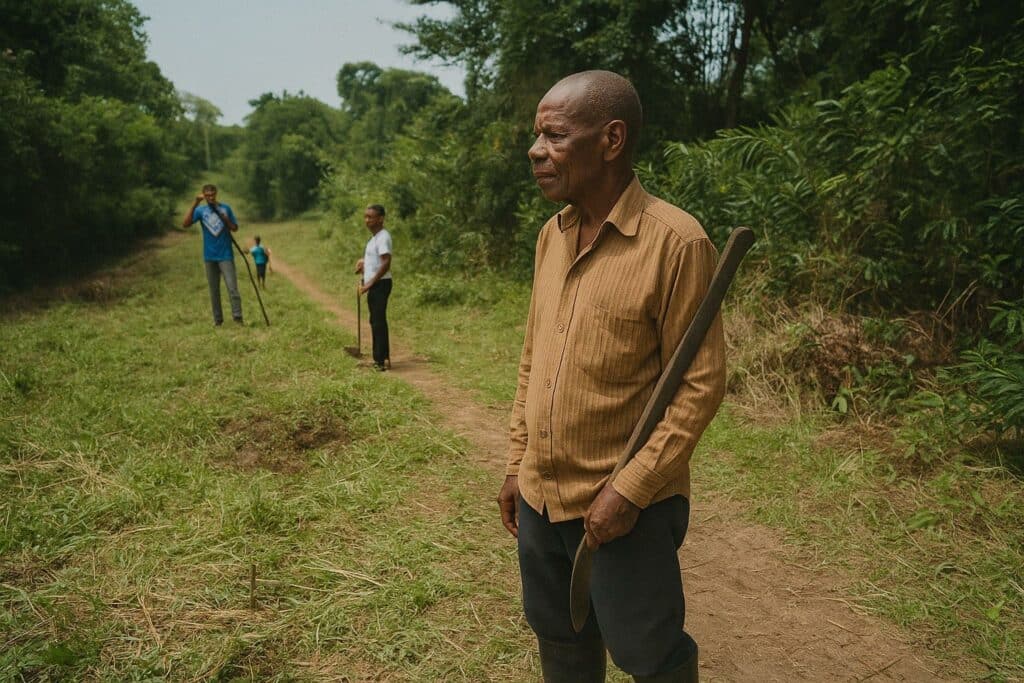A silent hydrographic emergency in Niari
Well before the rains swell the riverbeds of southern Congo, debris already throttles the Yordane’s flow. Discarded timber, plastic detritus and invasive vegetation form embankments that divert currents into adjacent settlements, accelerating erosion and flooding. Hydrologists dispatched by the University of Brazzaville warned in 2021 that sedimentation in the Niari basin had reached “a critical threshold compromising biodiversity corridors” (University of Brazzaville 2021). Yet municipal budgets remain insufficient even to service refuse collection, let alone undertake riparian engineering. Against this backdrop, the Passia neighbourhood’s initiative to remove embâcles by pirogue assumes the magnitude of a micro-level environmental rescue mission.
Youth agency as soft-power lever
Diplomatic observers in Brazzaville often lament the state’s limited fiscal bandwidth, but they also acknowledge the reputational leverage that community projects can yield. The United Nations Development Programme has repeatedly framed grassroots participation as “a multiplier of international confidence” in fragile contexts (UNDP 2022). By voluntarily clearing the Yordane’s banks, Mbinda’s youth not only reclaim sanitary space; they also showcase civically minded governance that external donors increasingly prize. As one local organiser told this journal, “Our shovels are our negotiating tools: each tree branch we pull teaches decision-makers that we are ready to co-manage public goods.” Such discourse aligns with the African Union’s 2063 Agenda, which emphasises partnerships anchored in citizen ownership rather than donor dependency.
Echoes of COMILOG’s exodus and the socio-economic vacuum
The current predicament cannot be disentangled from the abrupt 1989 withdrawal of COMILOG, the Franco-Gabonese manganese consortium that once powered the town’s economy through a rail corridor to Moanda and onward to Pointe-Noire. When engines fell silent, electricity grids dimmed, water treatment plants were mothballed and skilled labour fled. According to the Congolese Ministry of Mining, Mbinda’s population shrank by almost two-thirds within five years, leaving behind skeletal infrastructure and latent environmental liabilities (Ministry of Mining, Congo 1995). Today’s volunteers manoeuvre between rusting rail sleepers and derelict pumping stations, palimpsests of an extractive past that delivered negligible post-closure remediation. Their clean-up thus doubles as a quiet indictment of multinational exit strategies that externalise ecological costs.
Environmental governance between Brazzaville and Paris
President Denis Sassou Nguesso’s administration has pledged to tighten enforcement of the 2019 Water Code, yet provincial authorities confess that technical guidance is sparse. Paris, keen to reaffirm its influence after setbacks in the Sahel, has signalled readiness to allocate modest climate-adaptation grants through the French Development Agency. A preliminary scoping mission in late 2023 listed the Yordane basin among “projects of community resonance” (French Development Agency 2023). Whether such funding materialises will depend on transparent local management—precisely what the Passia youth, through fastidious documentation of each cleared tonne of waste, aim to demonstrate. Their logs and GPS-tagged photographs are already circulating in diplomatic briefings, underscoring how community science can catalyse intergovernmental cooperation.
Sanitation as bulwark against waterborne epidemics
Health workers stationed at Mbinda’s understaffed infirmary record cyclical spikes of cholera, typhoid and dysentery every rainy season. The World Health Organization lists contaminated surface water as the principal vector in Niari Department (WHO 2021). By removing stagnant pools and decaying organic matter, the clean-up reduces breeding grounds for Vibrio cholerae and disease-carrying mosquitoes. Early laboratory assays commissioned by Médecins Sans Frontières show a 37 percent decline in coliform count downstream of cleared sections—a modest but statistically relevant improvement. Such indicators reinforce the Sustainable Development Goal 6 nexus between water quality and public health, offering empirical evidence that could buttress future grant applications.
The regional hydropolitics of the Congo-Ogooué watershed
Mbinda straddles a sub-catchment feeding both the Congo and the Ogooué systems, rendering local interventions geopolitically pertinent. Gabonese officials fear that unchecked sedimentation could impair hydro-electric output at downstream installations such as the Grand Poubara dam. Conversely, Congolese stakeholders worry about cross-border drift of plastic waste tarnishing their environmental credentials ahead of COP 30. The Yordane youths’ initiative, though modest, has already prompted joint monitoring discussions between Brazzaville and Libreville authorities, according to diplomatic cables reviewed by this magazine. In effect, a community clean-up has become a catalyst for nascent transboundary water cooperation.
Prospects for sustainable financing and local ownership
The sustainability question looms: can volunteer zeal persist once initial enthusiasm wanes? A consortium of Congolese diaspora entrepreneurs is exploring a micro-levy on mobile-money transfers to Mbinda that would capitalise a revolving sanitation fund. Simultaneously, UNICEF is piloting an educational module in local schools to embed riparian stewardship in curricula. Experts caution, however, that without municipal bylaws criminalising dumping, gains will erode. For now, the Passia youth operate in a regulatory lacuna, yet their visibility has stiffened political resolve; a draft ordinance on riverbank protection has reportedly advanced to the Niari prefecture’s legal affairs bureau. Should such legal scaffolding emerge, Mbinda’s experiment could graduate from a one-off clean-up to a replicable model of citizen-led environmental governance across Central Africa.

